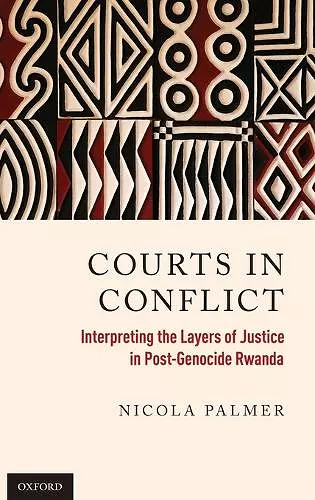Courts in Conflict
Interpreting the Layers of Justice in Post-Genocide Rwanda
Format:Hardback
Publisher:Oxford University Press Inc
Published:7th May '15
Currently unavailable, and unfortunately no date known when it will be back
This hardback is available in another edition too:
- Paperback£36.99(9780190941895)

The rise of international criminal trials has been accompanied by a call for domestic responses to extraordinary violence. Yet there is remarkably limited research on the interactions among local, national, and international transitional justice institutions. Rwanda offers an early example of multi-level courts operating in concert, through the concurrent practice of the United Nations International Criminal Tribunal for Rwanda (ICTR), the national Rwandan courts, and the gacaca community courts. Courts in Conflict makes a crucial and timely contribution to the examination of these pluralist responses to atrocity at a juncture when holistic approaches are rapidly becoming the policy norm. Although Rwanda's post-genocide criminal courts are compatible in law, an interpretive cultural analysis shows how and why they have often conflicted in practice. The author's research is derived from 182 interviews with judges, lawyers, and a group of witnesses and suspects within all three of the post-genocide courts. This rich empirical material shows that the judges and lawyers inside each of the courts offer notably different interpretations of Rwanda's transitional justice processes, illuminating divergent legal cultures that help explain the constraints on the courts' effective cooperation and evidence gathering. The potential for similar competition between domestic and international justice processes is apparent in the current practice of the International Criminal Court (ICC). However, this competition can be mitigated through increased communication among the different sites of justice, fostering legal cultures of complementarity that can more effectively respond to the needs of affected populations.
In providing such a 'thick description' of the courts, their interactions and legitimation strategies, Palmer's book breaks new grounds and is truly interdisciplinary, drawing on international criminal law, legal anthropology, history, politics and institutional sociology. * Leila Ullrich, Journal of International Criminal Justice *
Palmer devotes a chapter to each court system. Her effective use of thick description reflects exemplary research, based on scores of interviews; meticulous examination of court records, statutes, and cases; and reference to an impressive array of relevant scholarship. Courts in Conflict thus ranks as a valuable addition to several areas: transitional justice; theory and practice of multilevel judicial systems; post-1994 Rwanda; and the questionable assumption that local, national, and international jurisdictions complement each other. Palmer's case study calls out for similar work as global justice efforts increase. * C. E. Welch, University at Buffalo, SUNY, Choice: Comparative Politics *
Nicola Palmer's Courts in Conflict bursts with intellect, verve, and insight. Palmer dignifies, illuminates, and educates. She demonstrates how different courts adjudicating genocide deliberately see themselves as fulfilling different and distinct ambitions. Palmer wisely approaches tensions among institutions not as technical or bureaucratic, but rather as cultural and ideational. This book serves the broader didactic purpose of instructing on how post-conflict justice, wherever and whenever, can become meaningful. * Mark A. Drumbl, Class of 1975 Alumni Professor of Law, Washington and Lee University & Director, Transnational Law Institute *
This book on the versions of transitional justice developed in the Rwandan genocide context well illustrates manifest tensions concerning political power, legitimacy, and the intersection between law and lawyers at the international, national, and local level. Dr. Palmer navigates this complex terrain with great clarity and rigor. The book is an excellent addition to the growing literature on the Rwandan case-study but also has much to offer to larger debates within transitional justice in general. An important book. * Kieran McEvoy, Professor of Law and Transitional Justice, Queens University Belfast *
Courts in Conflict: Interpreting the Layers of Justice in Post-Genocide Rwanda is an incisive and important work. Based on original empirical research, Palmer offers new insights into the justice processes that followed the 1994 Rwandan genocide and a groundbreaking analysis of the interaction of national and international criminal tribunals more broadly. Courts in Conflict is a significant contribution to the field; it warrants close reading by scholars, practitioners, and policy makers alike. * Madeline Morris, Professor of Law, Duke Law School *
For the authoritative comparative study into all aspects of the transnational judicial reckoning with Rwanda's genocide and a fresh interpretation of the role courts can play in reestablishing institutional legitimacy after political transition - read this book. * Ruti Teitel, Ernst C. Stiefel Prof of Comparative Law, New York Law School & Author, Globalizing Transitional Justice *
Palmer's study presents a valuable diagnosis for multiple transitional justice initiatives that fail to aggregate their aims and reveals how some of the boundaries of transitional justice are sketched from the inside the courts themselves. This makes the book a must read both for practitioners engaged in international or transnational justice and cooperation, as well as for students who are interested in making more sense of transitional justice initiatives in post-conflict situations. Equally, it provides crucial guidance for further empirical studies. * Gabriela-Mihaela Ivan-Cucu, Univ. of Nottingham, Journal of Conflict & Security Law *
ISBN: 9780199398195
Dimensions: 160mm x 239mm x 28mm
Weight: 458g
240 pages